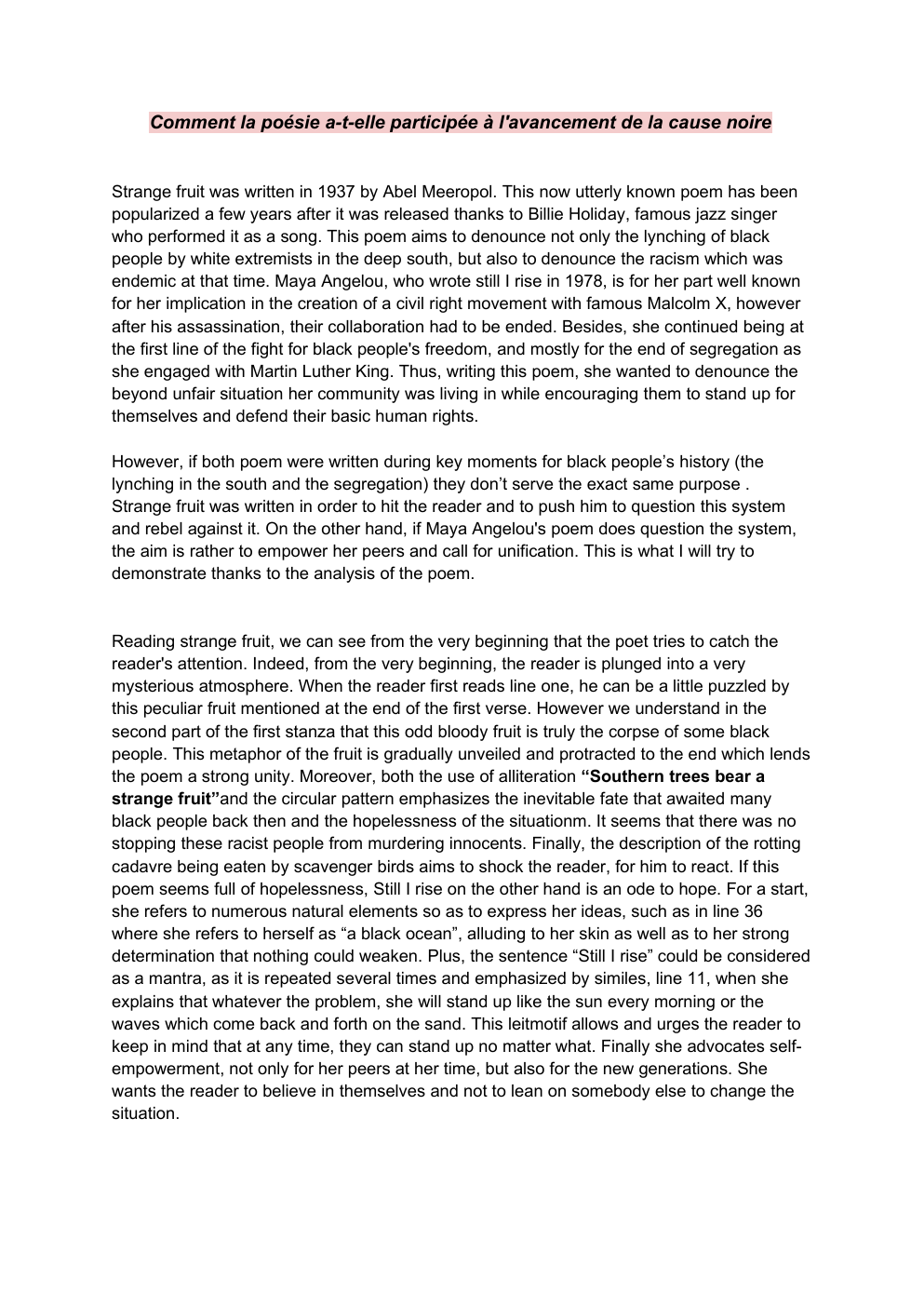comment la poésie a t-elle participée a l'émancipation de la communauté afro américaine
Publié le 06/04/2022

Extrait du document
«
Comment la poésie a-t-elle participée à l'avancement de la cause noire
Strange fruit was written in 1937 by Abel Meeropol.
This now utterly known poem has been
popularized a few years after it was released thanks to Billie Holiday, famous jazz singer
who performed it as a song.
This poem aims to denounce not only the lynching of black
people by white extremists in the deep south, but also to denounce the racism which was
endemic at that time.
Maya Angelou, who wrote still I rise in 1978, is for her part well known
for her implication in the creation of a civil right movement with famous Malcolm X, however
after his assassination, their collaboration had to be ended.
Besides, she continued being at
the first line of the fight for black people's freedom, and mostly for the end of segregation as
she engaged with Martin Luther King.
Thus, writing this poem, she wanted to denounce the
beyond unfair situation her community was living in while encouraging them to stand up for
themselves and defend their basic human rights.
However, if both poem were written during key moments for black people’s history (the
lynching in the south and the segregation) they don’t serve the exact same purpose .
Strange fruit was written in order to hit the reader and to push him to question this system
and rebel against it.
On the other hand, if Maya Angelou's poem does question the system,
the aim is rather to empower her peers and call for unification.
This is what I will try to
demonstrate thanks to the analysis of the poem.
Reading strange fruit, we can see from the very beginning that the poet tries to catch the
reader's attention.
Indeed, from the very beginning, the reader is plunged into a very
mysterious atmosphere.
When the reader first reads line one, he can be a little puzzled by
this peculiar fruit mentioned at the end of the first verse.
However we understand in the
second part of the first stanza that this odd bloody fruit is truly the corpse of some black
people.
This metaphor of the fruit is gradually unveiled and protracted to the end which lends
the poem a strong unity.
Moreover, both the use of alliteration “Southern trees bear a
strange fruit”and the circular pattern emphasizes the inevitable fate that awaited many
black people back then and the hopelessness of the situationm.
It seems that there was no
stopping these racist people from murdering innocents.
Finally, the description of the rotting
cadavre being eaten by scavenger birds aims to shock the reader, for him to react.
If this
poem seems full of hopelessness, Still I rise on the other hand is an ode to hope.
For a start,
she refers to numerous natural elements so as to express her ideas, such as in line 36
where she refers to herself as “a black ocean”, alluding to her skin as well as to her strong
determination that nothing could weaken.
Plus, the sentence “Still I rise” could be considered
as a mantra, as it is repeated several times and emphasized by similes, line 11, when she
explains that whatever the problem, she will stand up like the sun every morning or the
waves which come back and forth on the sand.
This leitmotif allows and urges the reader to
keep in mind that at any time, they can stand up no matter what.
Finally she advocates selfempowerment, not only for her peers at her time, but also for the new generations.
She
wants the reader to believe in themselves and not to lean on somebody else to change the
situation..
»
↓↓↓ APERÇU DU DOCUMENT ↓↓↓
Liens utiles
- rap. n.m., forme poétique et musicale populaire d'origine afro-américaine. Née vers
- La Poésie américaine par Georges-Albert Astre Au milieu des années 60, la poésie est aux États-Unis en situation privilégiée : jamais on n'avait publié tant de vers, jamais ils n'avaient rencontré pareille audience.
- Tout en préservant son caractère ethnique, la musique afro-américaine a
- afro-américaine, musique - musique du monde.
- La poésie américaine (Exposé – Art & Littérature – Collège/Lycée)













